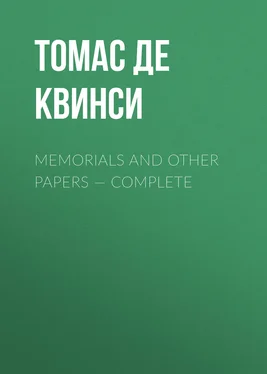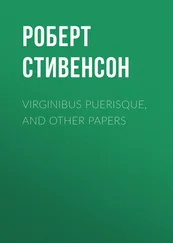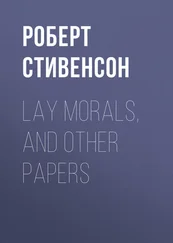Томас Де Квинси - Memorials and Other Papers — Complete
Здесь есть возможность читать онлайн «Томас Де Квинси - Memorials and Other Papers — Complete» — ознакомительный отрывок электронной книги совершенно бесплатно, а после прочтения отрывка купить полную версию. В некоторых случаях можно слушать аудио, скачать через торрент в формате fb2 и присутствует краткое содержание. Жанр: foreign_prose, literature_19, foreign_antique, на английском языке. Описание произведения, (предисловие) а так же отзывы посетителей доступны на портале библиотеки ЛибКат.
- Название:Memorials and Other Papers — Complete
- Автор:
- Жанр:
- Год:неизвестен
- ISBN:нет данных
- Рейтинг книги:5 / 5. Голосов: 1
-
Избранное:Добавить в избранное
- Отзывы:
-
Ваша оценка:
- 100
- 1
- 2
- 3
- 4
- 5
Memorials and Other Papers — Complete: краткое содержание, описание и аннотация
Предлагаем к чтению аннотацию, описание, краткое содержание или предисловие (зависит от того, что написал сам автор книги «Memorials and Other Papers — Complete»). Если вы не нашли необходимую информацию о книге — напишите в комментариях, мы постараемся отыскать её.
Memorials and Other Papers — Complete — читать онлайн ознакомительный отрывок
Ниже представлен текст книги, разбитый по страницам. Система сохранения места последней прочитанной страницы, позволяет с удобством читать онлайн бесплатно книгу «Memorials and Other Papers — Complete», без необходимости каждый раз заново искать на чём Вы остановились. Поставьте закладку, и сможете в любой момент перейти на страницу, на которой закончили чтение.
Интервал:
Закладка:
A battle is by possibility the grandest, and also the meanest, of human exploits. It is the grandest when it is fought for godlike truth, for human dignity, or for human rights; it is the meanest when it is fought for petty advantages (as, by way of example, for accession of territory which adds nothing to the security of a frontier), and still more when it is fought simply as a gladiator's trial of national prowess. This is the principle upon which, very naturally, our British school-boys value a battle. Painful it is to add, that this is the principle upon which our adult neighbors the French seem to value a battle.
To any man who, like myself, admires the high-toned, martial gallantry of the French, and pays a cheerful tribute of respect to their many intellectual triumphs, it is painful to witness the childish state of feeling which the French people manifest on every possible question that connects itself at any point with martial pretensions. A battle is valued by them on the same principles, not better and not worse, as govern our own schoolboys. Every battle is viewed by the boys as a test applied to the personal prowess of each individual soldier; and, naturally amongst boys, it would be the merest hypocrisy to take any higher ground. But amongst adults, arrived at the power of reflecting and comparing, we look for something nobler. We English estimate Waterloo, not by its amount of killed and wounded, but as the battle which terminated a series of battles, having one common object, namely, the overthrow of a frightful tyranny. A great sepulchral shadow rolled away from the face of Christendom as that day's sun went down to his rest; for, had the success been less absolute, an opportunity would have offered for negotiation, and consequently for an infinity of intrigues through the feuds always gathering upon national jealousies amongst allied armies. The dragon would soon have healed his wounds; after which the prosperity of the despotism would have been greater than before. But, without reference to Waterloo in particular, we , on our part, find it impossible to contemplate any memorable battle otherwise than according to its tendency towards some commensurate object. To the French this must be impossible, seeing that no lofty (that is, no disinterested) purpose has ever been so much as counterfeited for a French war, nor therefore for a French battle. Aggression, cloaked at the very utmost in the garb of retaliation for counter aggressions on the part of the enemy, stands forward uniformly in the van of such motives as it is thought worth while to plead. But in French casuistry it is not held necessary to plead _any_thing; war justifies itself. To fight for the experimental purpose of trying the proportions of martial merit, but (to speak frankly) for the purpose of publishing and renewing to Europe the proclamation of French superiority— that is the object of French wars. Like the Spartan of old, the Frenchman would hold that a state of peace, and not a state of war, is the state which calls for apology; and that already from the first such an apology must wear a very suspicious aspect of paradox.
Читать дальшеИнтервал:
Закладка:
Похожие книги на «Memorials and Other Papers — Complete»
Представляем Вашему вниманию похожие книги на «Memorials and Other Papers — Complete» списком для выбора. Мы отобрали схожую по названию и смыслу литературу в надежде предоставить читателям больше вариантов отыскать новые, интересные, ещё непрочитанные произведения.
Обсуждение, отзывы о книге «Memorials and Other Papers — Complete» и просто собственные мнения читателей. Оставьте ваши комментарии, напишите, что Вы думаете о произведении, его смысле или главных героях. Укажите что конкретно понравилось, а что нет, и почему Вы так считаете.












